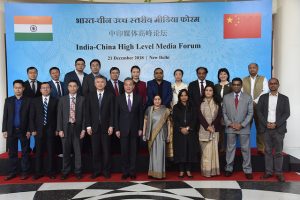
In the dying days of 2018, a new idiom of India-China relations was birthed on a crisp wintry afternoon in New Delhi as the two Asian giants unveiled a 10-point agenda to enhance culture exchanges and people-to-people (P2P) contacts to undergird their growing relationship with the glow of soft power.
Culture and P2P, normally a footnote or an afterthought in diplomatic discourse, moved to the forefront of India-China relationship as India’s External Affairs Minister Sushma Swaraj and her Chinese counterpart Wang Yi held their first meeting under the newly-constituted India-China High-Level Mechanism on People-to-People Exchanges. The P2P mechanism emanated from the first informal summit between Prime Minister Narendra Modi and Chinese President Xi Jinping in the city of Wuhan in April 2018, reflecting the joint resolve of the two leaders to expand the canvas of this crucial partnership.
P2P: Perfect 10
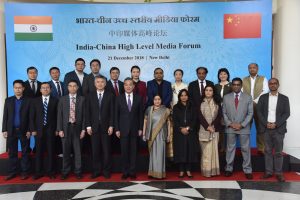
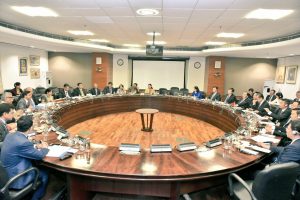
Mrs Swaraj encapsulated the importance of P2P exchanges in her remarks at the joint inauguration of the third India-China Media Forum. “Unlike earlier when India and China discussed cultural and P2P issues rarely for more than 10 minutes, today we talked only about these two subjects for two hours”, she said.
“Both our leaders believe that improving people-to-people exchanges will help in boosting bilateral relations,” she said.
The two foreign ministers jointly announced the 10 focus areas which will receive special attention in this new framework of P2P and cultural exchanges. These include film and television co-production, media, sports, youth affairs, tourism, traditional medicine, exchanges between cities and states, yoga and academics.
Arc of Understanding
Terming the India-China ties as a “special partnership” and a “stabilising factor at a time of global uncertainty,” Mrs Swaraj underlined that the joint forums across different domains, including media, academia and think tanks, are designed to promote a greater understanding of each other. In particular, she stressed on the positive role of the media in enhancing mutual understanding.
On his part, the Chinese foreign minister said that better ties between New Delhi and Beijing and greater P2P exchanges could “serve as a driving force for entire mankind”.
The two foreign ministers also urged the media of the two countries to make a positive contribution to the bilateral relationship and present a correct picture of China and India to their audience.
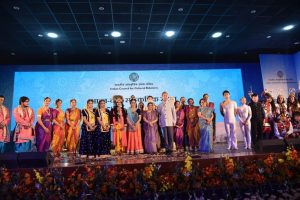
Mr Wang said that the meeting was a “full success” and stressed that the top leadership of both the countries “paid great attention and have high expectation from P2P exchanges”. He also termed the P2P exchange mechanism a “major initiative in the history of India-China relationships” and expressed confidence that it will “help consolidate the popular basis for state-to-state relations”.
The Chinese foreign minister said that both sides agreed to take “active part in P2P exchanges under the framework of the SCO, BRICS, East Asia Forum and ancient civilizational co-operation in effort to serve as a driving force for regional and global peace and development”.
This umbrella mechanism will cohere over 40 existing programmes for cultural and P2P cooperation and will also include new initiatives.
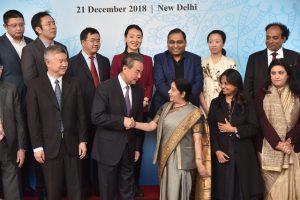
Putting people’s aspirations at the centre of the India-China partnership, Mrs Swaraj said underscored that India and China have “similar goals of giving their people a better life”. “Thanks to the economic reforms carried out in China over the last 40 years of reform and opening up (gaige kaifang, 改革开放), it has rapidly grown to become world’s second biggest economy” she said. “India too has witnessed robust growth and is well on path to become a USD 5 trillion economy by 2025”.
The launch of the India-China High-Level Mechanism on People-to-People Exchange on December 21 served as a fitting finale to a year of unprecedented high-level diplomacy, with four meetings between the leaders of the two countries spanning three continents. These meetings have set a positive and upbeat tone for the future trajectory of India-China relations in 2019, which will see the visit of the Chinese president to India for his second informal meeting with the Indian leader.
Author Profile

- Manish Chand is Founder and Editor-in-Chief of India Writes Network (www.indiawrites.org) and India and World, a pioneering magazine focused on international affairs. He is CEO, Centre for Global India Insights, an India-based think tank focused on global affairs.
Latest entries
 India and the WorldFebruary 27, 2026Modi visit: India-Israel partnership enters a new era
India and the WorldFebruary 27, 2026Modi visit: India-Israel partnership enters a new era India and the WorldFebruary 24, 2026Unravelling Modi’s Israel journey: What to expect
India and the WorldFebruary 24, 2026Unravelling Modi’s Israel journey: What to expect India and the WorldFebruary 17, 2026South-by-South: Focus on people-centric solutions at India AI summit
India and the WorldFebruary 17, 2026South-by-South: Focus on people-centric solutions at India AI summit India and the WorldFebruary 7, 2026Modi hails interim India-US trade deal, Goyal says no concessions made on agriculture
India and the WorldFebruary 7, 2026Modi hails interim India-US trade deal, Goyal says no concessions made on agriculture







